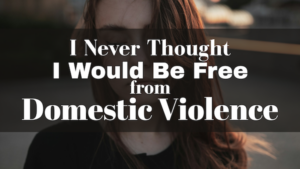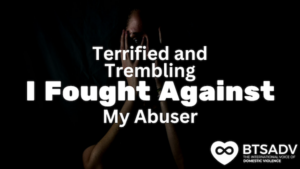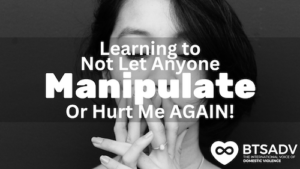Written by: Christine Miller
It is not uncommon for survivors to exit an abusive relationship and be unable to come to terms with the trauma they experienced. For some of us, the desire to put it behind us and move forward with our life might lead us to convince ourselves that what happened to us was not so bad. Others are unable to reconcile the trauma and avoid disclosing the abuse to anyone – even years later – because of the shame we carry when we leave.
Still others might have carried the pain of the abuse with them for their entire lives because of the fear of what might happen to us when we speak the words, “I was abused.” Survivor Christine has lived trying to avoid the pain she endured with a boyfriend while she was in high school, and she has decided that she is ready to reveal her truth and break her silence.
It took me years to say the phrase “abusive relationship” or call myself a “survivor.” Early on, when I thought back on my ex-boyfriend and our high school romance, the shame and fear were suffocating, so instead of leaning in and trying to understand it or heal, I avoided the thoughts completely.
That is how I survived the first five years “after,” because that is how I looked at my life; there was “before” and “after.” I lost most of my memories from “during,” and I made no effort to retrieve them. I could not remember my high school graduation, senior prom, awards, or performances. It was all lost in the wreckage, but that, to me, was worth it if it meant I could forget the rest.
And now in the “after,” it felt safest just to exist, to merely breathe and survive because even though I never had to see him again, it did not matter. He was already everywhere. His musky scent lingered on my skin, and the memories of his rough, abrasive hands were constant, waiting to burst into the forefront of my mind if I let it. So I did not let it. Not for a long time.
Despite Christine’s efforts to forget her past, the effects of trauma lingered just below the surface, waiting to be triggered.
I remember once being in line at a 7-eleven, years after the relationship ended, and a stranger in front of me started yelling at the clerk about an expired coupon. Her voice was loud and scolding, and I noticed my hands were shaking. The panic swelled from my stomach to my chest, and the next thing I knew, I was sobbing uncontrollably in a nearby bathroom stall. My body remembered, even if my mind had tried forcibly to forget.
I finally could not take the panic attacks any longer as the memories came flooding to the surface, so I found a therapist. Through EMDR and talk therapy, she helped me tell my story, my real story. Not the story I told everyone else, the lies about him being different when we were alone, being respectful and kind, and romantic.
I told her about how he would follow me home from school, even after we broke up, to the point where I just started expecting it and growing numb to his unwanted touch. And how, after long enough, people stopped asking why I had become so withdrawn, so thin, so frail. And when people did notice him berate me in public or cause a scene at my expense, everyone was quick to look the other way, even the teachers.
Because of a lack of awareness and understanding of teen dating violence, those around Christine enabled her abuser’s behavior through their lack of action.
It was not bullying to them because he was my boyfriend, so to the world, it was just “relationship drama.” And the silence that surrounded us only made him stronger, and it reiterated to me that this must be normal or acceptable because surely somebody would step in if it was not. However, I know now that teen dating violence is often ignored by peers and adults alike.
A recent study found that 60% of teens have been a victim of abuse from a dating partner. I was not alone, and my story is not unique. But as a 16-year-old girl, I believed that my entire self-worth relied on whether or not I had a boyfriend, so I tried desperately to make him love me. But all he did was hurt me instead, so I figured that must have been my fault. I told myself that if I had only been prettier or easier to love, it could have been different.
When I got through that stage, I blamed myself for not fighting back enough, for tempting him, for not being strong enough to ask for help. I did not know then what I know now. I did not know that I had choices, I did not know that love was not supposed to hurt, and I did not know that I deserved so much better than that.
Christine wants to use her experiences surviving teen dating violence to raise awareness and help others who are being abused.
When people hear my story now and ask, “Why didn’t you leave?” or “Why didn’t you call the police?” it makes me feel small and voiceless all over again, because the real answer to that is filled with so much complexity and shame, it is not black and white. Dating violence is the long con where someone convinces you slowly that you cannot live without them and then methodically drains you of everything else. When I was 16, he was my entire world. I actually cried when he broke up with me because I did not know who I was without him. Today, that memory devastates me because it shows how far gone I was.
The desire to be loved, especially as a teenage girl, is overwhelming, and until we start empowering young women and teaching expectations of healthy relationships, this cycle will only worsen. We also have to stop minimizing teenagers when they talk about dating, sex, and relationships. Teens often get brushed off by adults because we assume their age and lack of maturity or experience is making them overdramatic, but that could not be farther from the truth.
Teens may not be equipped to deal with these types of experiences, but they are dealing with them, regardless of whether we choose to believe it or not. So it is up to all of us to break the silence, remove the stigma, and extend a hand to the teens who think they are the only one that this is happening to when that could not be farther from the truth.
*Christine is the author of the bestselling YA novel Forgiven Are the Starry-Eyed which explores teen dating violence through the eyes of one girl’s volatile, delicate journey. To learn more about her book, click here.
**If you or someone you know is in an abusive relationship, there is help. You can visit the Break the Silence website at www.breakthesilencedv.org, chat with one of our helpline advocates at 855-287-1777, or send a private message through our Facebook page.
========
What’s YOUR Raw Truth?
Sharing our stories can be incredibly empowering while also helping others connect with survivors who have similar experiences.
If you are inspired to share your story with us, submit here. You can choose to remain anonymous.









